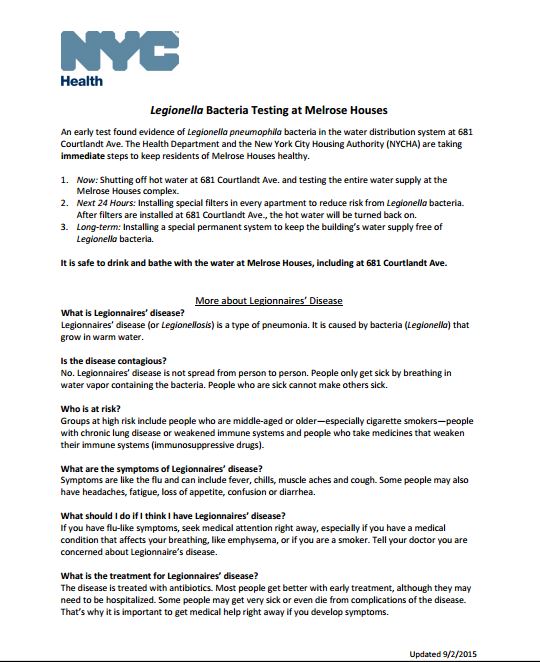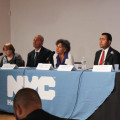Late Wednesday evening, the city Department of Health and Mental Health (DOHMH) disclosed that a new cluster of Legionnaires’ disease cases had appeared at a Bronx public housing development. DOHMH reported there have been four cases of Legionnaires’ at the Melrose Houses in the South Bronx over the past 6 months: one occurring earlier in the year, two during the recently ended South Bronx outbreak, and a recent case. Only one patient is currently hospitalized; the other three previous patients were treated and released.
Test results at Melrose House showed legionella at 681 Courtlandt Avenue, while two other buildings (304 E 156th Street and 700 Morris Avenue) were negative for the bacteria.
During the Health Department investigation into a recently diagnosed case of Legionnaires’ Disease identified a small cluster of Legionnaires’ cases at the Melrose Houses in the South Bronx. As part of its routine assessment of such clusters, the DOHMH, in close coordination with NYCHA, Tuesday and today tested the water distribution system in the buildings of Melrose Houses. The water in one of the buildings tested positive on a preliminary test for the presence of Legionella pneumophila bacteria; two other buildings have tested negative and test results are outstanding at five other buildings in the complex. Out of an abundance of caution, and in consultation with the federal Centers for Disease Control and Prevention, the Health Department has recommended remediation in this building. NYCHA will shut off hot water at the building that tested positive, and will install water filters in every apartment unit that eliminate the bacteria. Hot water service will be restored as soon as filters installed. This plan will apply to any building that preliminarily tests positive. Long-term plans for disinfection are also being developed.
Legionnaires’ disease is not contagious and is easily treatable with antibiotics. Adults with flu-like symptoms, such as fever, cough, or difficulty breathing, should seek immediate medical attention.


















Follow Us